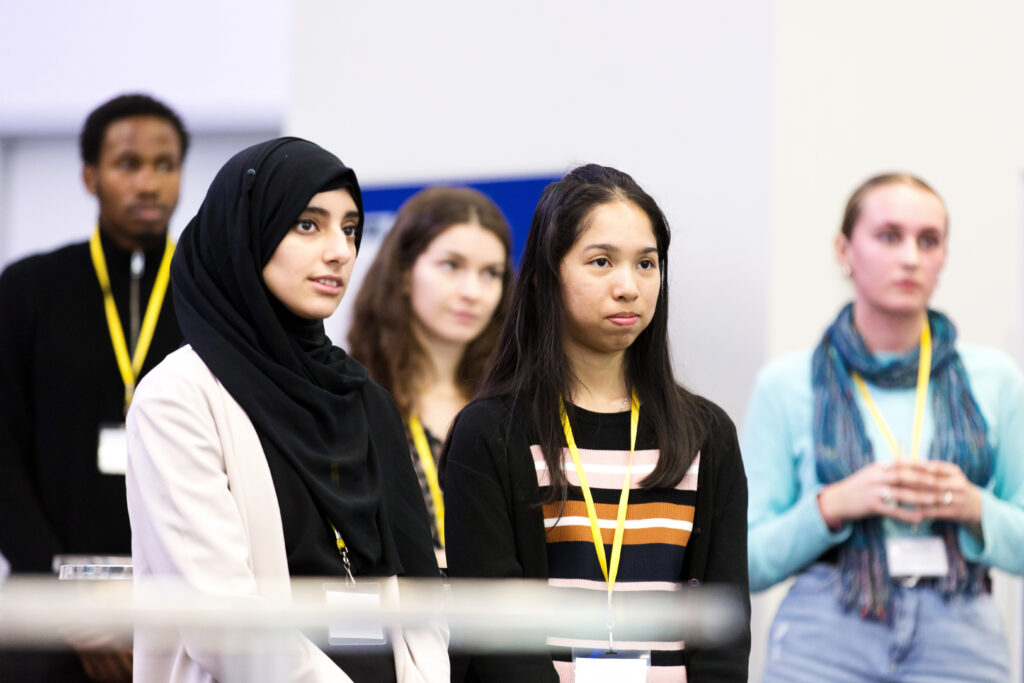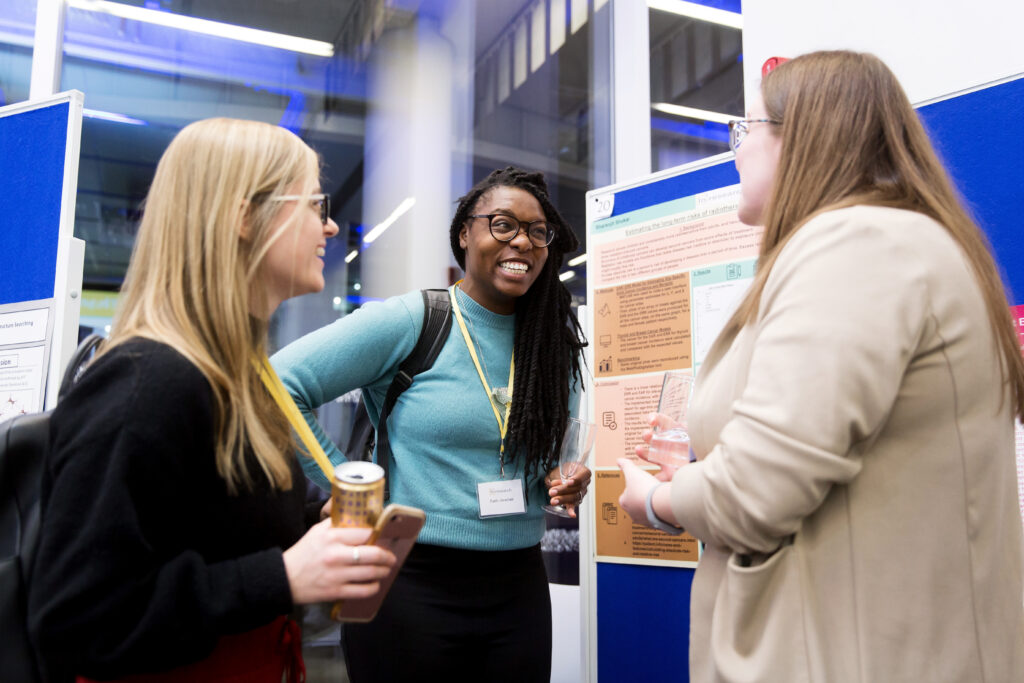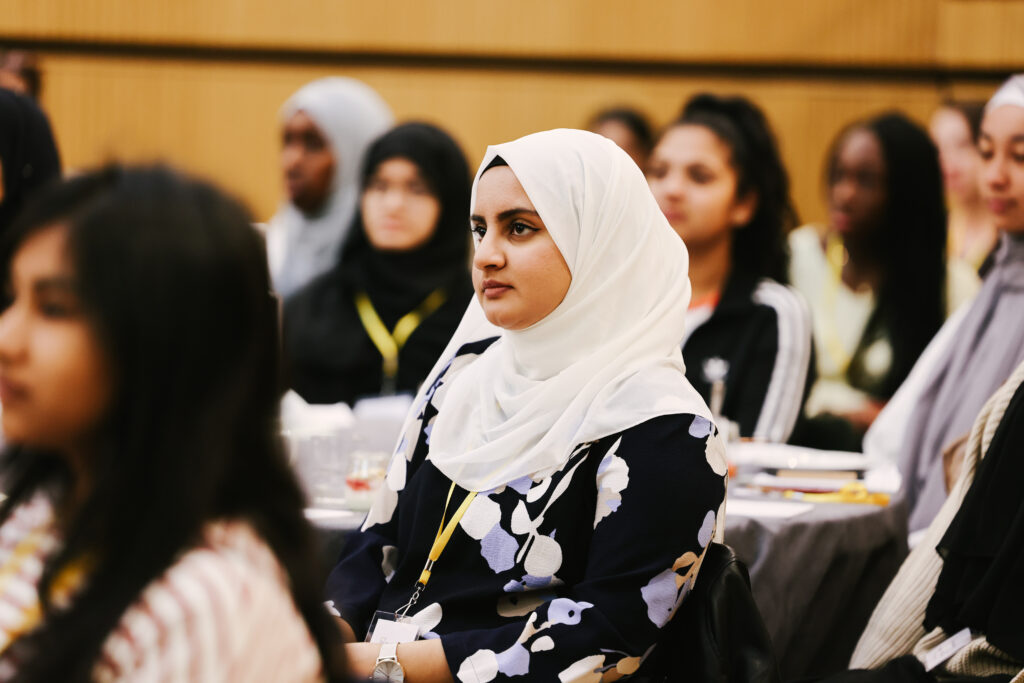Frequently Asked Questions for Volunteers
Welcome to In2research Volunteering FAQs. Here, you can discover answers to frequently asked questions about the In2research programme and your involvement as a volunteer. Our goal is to provide clear information and support your In2research journey.



General FAQs
What are the aims of the programme?
The In2research programme works with people from low socio-economic and under-represented backgrounds to address two significant barriers these groups face when accessing postgraduate research (PGR) study: a knowledge gap in understanding what postgraduate research is, how to access it and what is required; and the vital research experience postgraduate research programmes require for a student’s application to be competitive.
The In2research programme also aims to build inclusion within institutions and challenge unconscious bias through a comprehensive workshop and development for academics.
Who are the In2research participants?
In2research participants are STEM, Arts and Humanities, or Social Sciences undergraduate students or graduates from low socio-economic and under-represented backgrounds who are considering a postgraduate research degree and/or a career in research.
They will vary in experience from second year undergraduate students to graduates with a Master’s degree. However all are passionate about their subjects and have shown a real thirst for knowledge.
What is the structure of the programme?
In2research is a year-long development and mentorship programme.
Participants receive:
- Four workshops delving deeply into key skills such as academic CV writing, communicating research, and preparing for interviews
- Four mentoring sessions with a subject specific academic mentor
- Two in-person away days to develop professional skills and practise networking skills
- One 8-week summer research placement supported by a tax-free stipend of over £3,000
For Mentors
What does an In2research Mentor do?
As a mentor, you will be supporting a small group of participants who are passionate about your area of research and who would love to learn more about the research career path.
You will be committing to four, one hour mentoring sessions between December 2024 and April 2025, with a suggested preparation time of one hour per session.
How do I apply?
When applications for the 2024/25 programme open, you will be able to complete the volunteer application form and provide information about your area of research.
What is the deadline for applying?
Applications will open in May 2024. You will have roughly 4 months to complete your application.
What are the Mentor sessions?
The mentor sessions are an opportunity for participants to seek your expert advice and delve more deeply into the topics covered in the four programme workshops, such as how to write an academic CV or prepare for a PhD interview.
We will offer pre-prepared tasks for you to work through with your group. However, your mentees will also be keen to hear your expert advice and learn about your experiences from your time in academia.
Do I have to prepare anything for the sessions?
We will support you on every step of your mentoring journey to ensure you have the confidence and skills to be a great mentor. The tasks discussed in mentoring sessions will be written by the In2research team and completed by participants in advance of the session.
You will receive a document before each mentoring session describing the task that has been set, as well as some of the key messages from their most recent skills workshop. We will also provide a list of talking points to help you to structure discussions in your sessions.
How will mentor sessions be organised?
Mentor sessions will take place online and will be organised between you and the mentees directly after the workshop in November 2024.
How will I be matched with participants?
Mentoring groups will be assigned based on the subject interest of mentees and research areas of mentors, with 2-3 mentees in each mentor group.
Please note, while we would love to give every applicant the opportunity, matching for mentors and placement hosts is based on the subject interests and needs of our participants and we cannot always guarantee a match will be available.
Will I need to supervise a participant for a placement?
You can be a mentor without being a placement host. However, you are very welcome to apply for both roles! The application form gives you the opportunity to apply for both at the same time. If you’re interested in hosting a placement host and want to learn more, head to the placement host FAQs.
Are there any other commitments?
We require mentors to attend induction and development workshop, as well as completing some evaluation feedback for the programme
What support will I receive?
The In2research team will support you throughout the process to ensure that you and your participant have productive and meaningful mentor sessions.
You will also be required to attend an online mentor induction, featuring race and cultural literacy training workshop.
What is the race and cultural literacy training workshop?
Designed in collaboration with Leading Routes and UPSIGN, this workshop will encourage you to reflect on how people have different experiences within research and education based on their perceived differences, such as their race, cultural background, and more.
This will give you an insight into the diverse needs of students, considering how the challenges they face in and out of professional settings may translate behaviourally, and give you confidence in interacting with people from different backgrounds.
What will I gain from being a mentor?
You can:
- gain new knowledge and skills via our workshop
- measure your impact with our impact reports
- practise your mentoring and teaching skills
Plus, you will be inspiring a participant to gain the skills they need to pursue their postgraduate research goals.
Do I get a formal qualification for taking part?
There is no formal qualification, but mentors will receive high-quality professional development as part of the programme, including a workshop on cultural and race literacy. We are also happy to provide letters of support and impact reports for you to include in your academic profile or future applications. You will have full support from the In2research team as you move through the year.
I cannot be a mentor this year but would like to know about future opportunities.
You can express your interest in being a mentor (or a host!) for the 2024/25 programme via this online form
For Placement Hosts:
What is an In2research Placement Host?
As a Placement Host, you will be committing to hosting an In2research participant for an eight-week placement in London in summer 2025, to either
(a) complete a bespoke research project
OR
(b) to contribute to a wider existing project
You will support the development of the participant’s research skills by setting goals to be monitored at weekly check-ins. You will also support them to create a research output they can present at our celebration event in September.
How do I apply for this opportunity?
When applications for the 2024/25 programme open, you will be able to complete the volunteer application form.
The application form will ask you to provide information about the research project opportunity available in your team. If you want to be a placement host but don’t yet have a specific research project, you can still apply!
Simply provide an overview of your research area and select to co-develop a project with a participant.
What is the application deadline for this opportunity?
Applications will open in May 2024. You will have roughly 2 months to complete your application.
How will I be matched to a participant?
The placement opportunities are advertised to In2research participants and they will select projects that are within their area of interest.
If we are able to match you with a participant we will let you know in November 2024.
We will then send you their CV and personal statement to review, after which you invite them for an informal interview in March/April 2025 and discuss the project or potential project ideas.
You will then host the participant for eight-weeks in summer, at a time agreed between you and the participant.
Please note, while we would love to give every applicant the opportunity, matching for mentors and placement hosts is based on the subject interests and needs of our participants and we cannot always guarantee a match will be available.
Can I submit more than one project idea?
Yes! We encourage placement hosts to submit as many project opportunities as possible to give participants lots of choice when they apply.
If you have any questions, or need any help completing your application, please don’t hesitate to contact us at [email protected]
Can I host more than one participant?
Absolutely. You can indicate on the application form how many participants you are able to host on placements.
What is an example of a research project idea?
Here is an example of a successful project from a previous year:
“Neurodegenerative Disorders – why do brain cells die?
The In2research participant will spend 8 weeks looking at two specific neurodegenerative disorders – frontotemporal dementia and amyotrophic lateral sclerosis – and why brain cells die in these diseases.
They will learn how to grow neurons in the lab, how to conduct a western blot, and several new methods of analysing data. This work will help further knowledge about these two diseases and has implications for therapeutics in the future.”
Does the placement need to be in-person?
Ideally, all placements will have some element of in-person work so that participants can benefit from working within a research group or department and have the opportunity to network with colleagues.
We recognise that some placements may be able to offer a hybrid working pattern. You can indicate this on the application form.
Do the projects have to be lab-based?
No. We are accepting projects in STEM, Arts & Humanities and Social Sciences subjects.
We are really open to considering a broad spectrum of project opportunities for our participants, not just in lab based/direct research, but also in areas such as coding, analysis, literature reviews and more.
If you have any questions about the suitability of your project, please get in touch via [email protected].
Do I need to be a Principal Investigator to host a placement?
No, you do not need to be head of a lab to host a placement.
However, you will need approval from your Line Manager/Supervisor before submitting a research project. If you are not available for the full 8-weeks, you can delegate the supervision to a colleague, while keeping the In2research team informed of any changes.
Who should I inform about my application to host an In2research participant?
On the application form, you will need to identify a Wellbeing Lead for the placement (such as a member of your department’s HR team). It would be courteous to let them know about your application, as well as gain the support and approval of any other staff who might be impacted by the placement (such as your supervisor/line manager, research lead or head of department).
Are the placements paid?
Our Placement Hosts are volunteers and therefore do not get monetary reimbursement for their time as Placement Hosts. The participant will be provided with a stipend of just over £3,000 for the duration of their placement. This amount will align with National Living Wage. Placement stipends will be paid to the participant directly by In2scienceUK.
Will we receive funding for lab costs?
Lab or consumable costs will not be covered by In2research for the placement.
What support will I receive?
The In2research team will support you throughout the process to ensure that you and your participant have a productive research placement.
You will also be required to attend an online placement host induction, featuring race and cultural literacy workshop.
What is the race and cultural literacy workshop?
Designed in collaboration with Leading Routes and UPSIGN, this workshop will encourage you to reflect on how people have different experiences within research and education based on their perceived differences, such as their race, cultural background, and more.
This will give you an insight into the diverse needs of students, considering how the challenges they face in and out of professional settings may translate behaviourally, and give you confidence in interacting with people from different backgrounds.
What will I gain from being a Placement Host?
You can:
- gain new knowledge and skills via our workshop
- measure your impact with our impact reports
- practise your leadership and supervisor skills
Plus, you will be inspiring a participant to gain the skills they need to pursue their postgraduate research goals.
I cannot be a Placement Host this year but would like to know about future opportunities.
You can express your interest in being a placement host (or a mentor!) for the 2024/25 programme via this online form.
I have other opportunities I would like to offer to the participants you work with, that don’t fit directly into the In2research eight-week placement. Is this possible?
We would also love to share any other relevant opportunities with our alumni community – these are past participants of the programme.
Please send details of these opportunities to [email protected]
Still have questions?
Get in touch with us at [email protected]